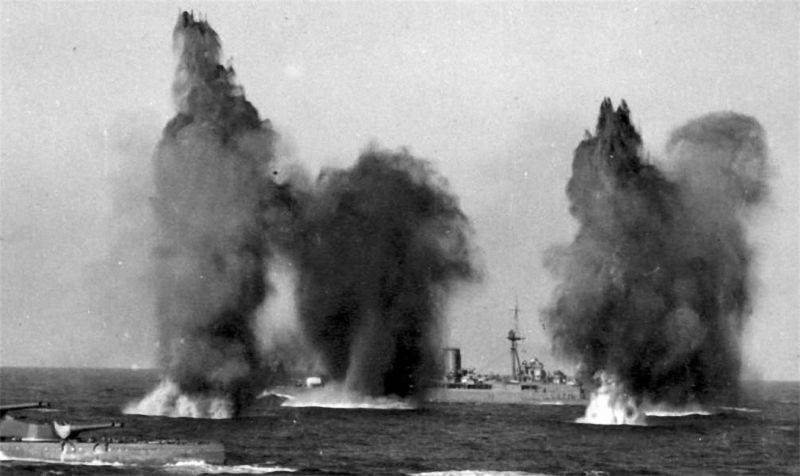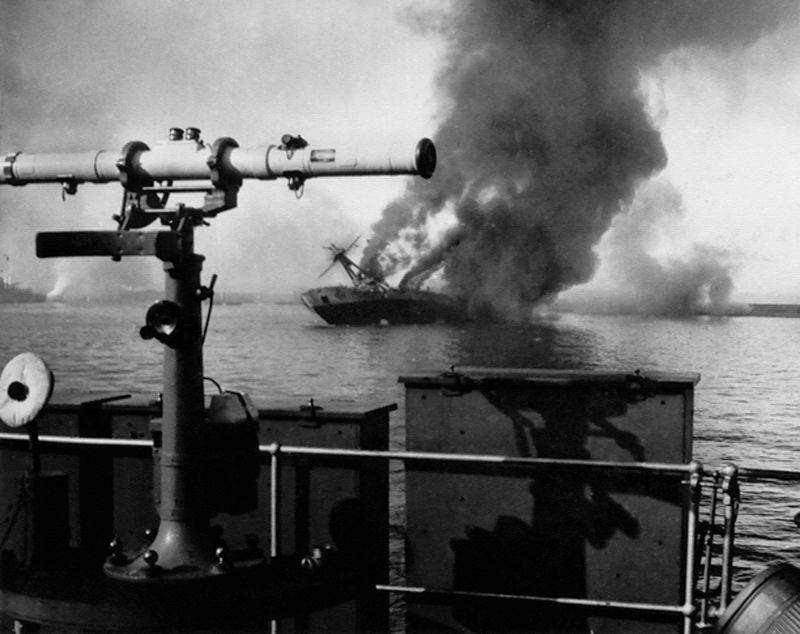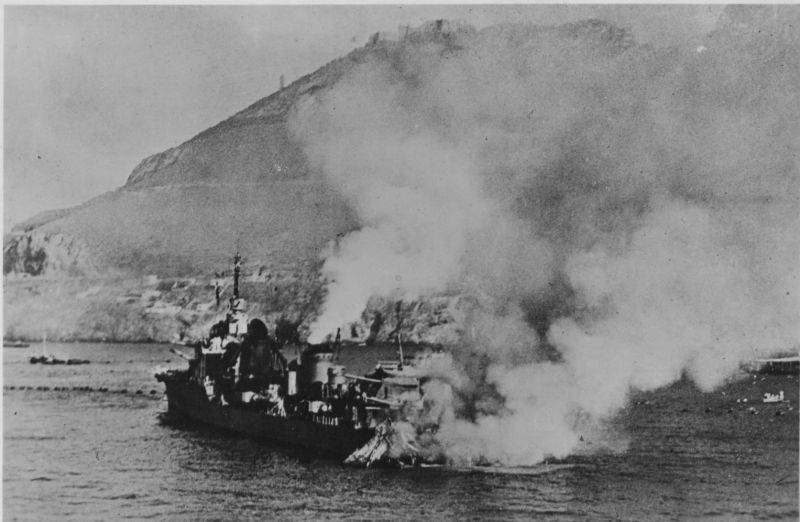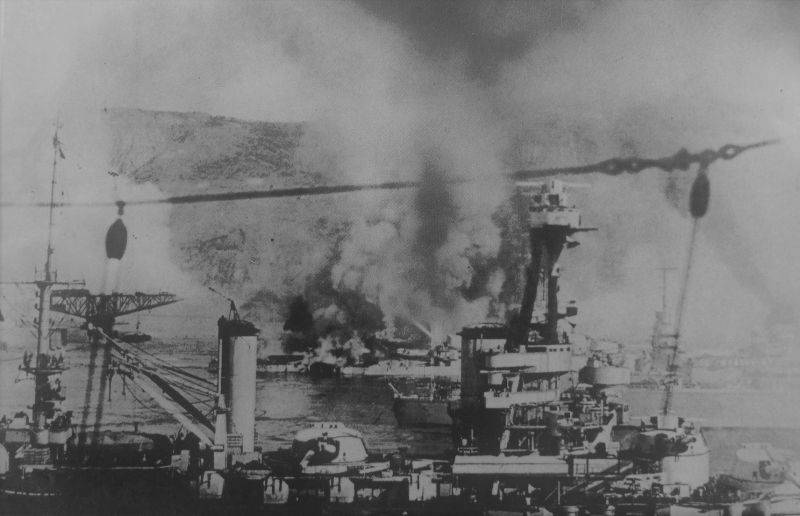Operation "Catapult". How the British drowned the French fleet

80 years ago, on July 3, 1940, Operation Catapult was performed. The British attacked the French fleet in English and colonial ports and bases. The attack was carried out under the pretext of preventing the French ships from falling under the control of the Third Reich.
Reasons for the operation
According to the Compiegne Armistice of June 22, 1940, the French fleet was subject to disarmament and demobilization of crews (Article No. 8). French ships were to arrive at ports designated by the German naval command, and placed under the supervision of German-Italian forces. For their part, the Germans promised that they would not use French ships fleet for military purposes. Then, during the negotiations, the Germans and Italians agreed that the French ships would be demilitarized in the unoccupied French ports (Toulon) and in the African colonies.
The head of Vichy France (with its capital in Vichy), Marshal Henri Pétain and one of the leaders of the Vichy regime, Commander-in-Chief of the French fleet, François Darlan, have repeatedly stated that not a single ship will be handed over to Germany. Darlan ordered the threat of seizure of ships to destroy their weapons and to flood or withdraw to the United States. However, the British government feared that the French fleet would strengthen the Reich. The fourth largest fleet in the world could significantly strengthen the naval capabilities of the German Empire. Germany and Italy could gain complete control over the Mediterranean basin, delivering a powerful blow to Britain’s strategic positions. Also, the German fleet was strengthened in Northern Europe. The Nazis at this time were preparing for the landing of an airborne army on the British Isles. With the help of French ships, Germany and Italy could expand their capabilities in Africa.
The British held a series of meetings with the French colonial civil and military administration, offering to break with the Vichy regime and go over to the side of England. In particular, the British encouraged the cooperation of the commander of the French Atlantic squadron, Jensoul. However, the British did not succeed. As a result, London decided to go on a decisive and risky operation to neutralize the French fleet. First of all, the British wanted to hijack or disable ships in ports and bases in Alexandria (Egypt), Mers el-Kebir (near the Algerian port of Oran), in the port of Pointe a Pitre on the island of Guadeloupe (French West Indies) and Dakar.

The tragedy of the French fleet
On the night of July 3, 1940, the British captured French ships, which were in the English ports of Portsmouth and Plymouth. Two old battleships “Paris” and Courbet (battleships of the 1910s class “Courbet”), two destroyers, several submarines and torpedo boats were captured. The French did not manage to provide resistance, since they did not expect attacks. Therefore, only a few people were injured. French sailors were interned. Some of the crew members were then expelled to France, others joined the ranks of "Free France" under the leadership of General de Gaulle.
In Egyptian Alexandria, the British managed to peacefully demilitarize French ships. Here stood the French battleship of the First World War Lorraine (ships of the 1910s series of the Brittany class), four cruisers and several destroyers. The French vice admiral Godfroix and the commander of the British Navy in the Mediterranean Sea Cunningham were able to agree. The French were able to maintain control of the ships, but, in fact, deprived them of the opportunity to leave and disarmed them. They handed the British fuel, gun locks and torpedo warheads. Some French crews went ashore. That is, the squadron lost its combat effectiveness and no longer posed a threat to the British. Later, these ships joined the forces of de Gaulle.
In Algeria, the French squadron was under the command of Vice Admiral Jensoul. French ships were in three ports: Mers al-Kebir, Oran and Algeria. At the unfinished naval base of Mers el-Kebir there were new battleships “Dunkirk”, “Strasbourg” (ships of the 1930s type “Dunkirk”), old battleships “Provence”, “Brittany” (ships of the type “Brittany”), six destroyer leaders (Volta, Mogador, Tiger, Links, Kersen, Terribl) and the Commandan Test hydro-aircraft carrier. Coast guard ships and auxiliary vessels were also based here. Ships could support coastal batteries and dozens of fighter jets. In Oran, a few miles to the east, there were 9 destroyers, several destroyers, watchdogs, minesweepers and 6 submarines. In Algeria were the 3rd and 4th divisions of cruisers (5-6 light cruisers), 4 leaders.
Britain put up a squadron (compound “H”) under Admiral Somerville. It included the powerful battle cruiser Hood, the old battleships of the 1910s Resolution and Valiant, the aircraft carrier Ark Royal, the light cruisers Arethuse, Enterprise, and 11 destroyers. The advantage of the British was that they were ready for battle, but the French did not. In particular, the latest French battleships stood aft to the pier, that is, they could not fire with the main caliber towards the sea (both main towers were on the bow). Psychologically, the French were not to attack the former allies, with whom they had just fought together against Germany.
On July 3, 1940, the British presented an ultimatum to the French command. The French fleet was to join the British and continue the struggle with Germany or proceed to the ports of England and join the “Free France; either go under an English escort to the ports of the West Indies or the USA, where it was subject to disarmament; subject to flooding; otherwise the British threatened an attack. Even before the deadlines for the ultimatum expired, British planes installed mines at the base exit so that French ships could not go to sea. The French exterminated one plane shot down, two pilots died.
The French admiral rejected the humiliating British ultimatum. Jensul replied that he could surrender ships only by order of the high command, drown only if the Germans and Italians threatened to seize them. Therefore, the only way out is to fight. This news was transmitted to Churchill, and he ordered to solve the problem: the French had to accept the conditions of surrender, either to sink the ships, or the British should destroy them. Somerville's ships opened fire at 16 54 minutes, even before Churchill's instructions and the expiration of the ultimatum. The British literally shot the French ships standing at the mole. De Gaulle later noted:
The battleship "Brittany" flew into the air. The battleships "Provence" and "Dunkirk" were damaged and ran aground off the coast. The leader of the Mogador was severely damaged, and the ship landed ashore. The battleship "Strasbourg" with the rest of the leaders was able to break into the sea. They were joined by destroyers from Oran. The British tried to attack the French battleship with the help of torpedo bombers, but without success. Hood began to pursue Strasbourg, but could not catch up. Somerville decided not to leave the old battleships without protection. In addition, a night battle with a large number of destroyers was too risky. Compound “H” turned to Gibraltar, where it returned on July 4. The Strasbourg and destroyers arrived in Toulon.
After the French claimed that the damage to the Dunkirk was minor, Churchill ordered Somerville to "complete the job." On July 6, the British re-attacked Mers el-Kebir with aviation. "Dunkirk" received new severe injuries and was removed from standing for several months (in early 1942 the battleship was transferred to Toulon). Thus, the British killed about 1300 people, about 350 were injured. One French battleship was destroyed, 2 were badly damaged. The British during the operation lost 6 aircraft and 2 pilots.

Hate france
The British also planned to attack the French aircraft carrier Bearn and two light cruisers in the French West Indies. But this attack was canceled due to US intervention. On July 8, 1940, the British attacked French ships in the port of Dakar (Senegal, West Africa). Using a torpedo, an English plane caused severe damage to the latest battleship Richelieu (the ship transported gold reserves of France and Poland to French colonies). In September, the British decided to land in Dakar. De Gaulle was with them. Britain wanted to seize the developed French colony under the base of "Free France". Also, Dakar was a convenient port, they brought here the gold reserve of France and Poland. However, the French in Dakar showed active resistance, and the Senegalese operation did not reach its goal.
As a result, Operation Catapult did not solve the main problem. The British could not capture or destroy the French fleet. However, they managed to capture, disarm and damage part of the ships, reducing the combat potential of the French fleet. The political effect was negative. The French did not understand the former allies and now cursed. In French society, already dissatisfied with the actions of the British during the Dunkirk operation and later, anti-English sentiment reigned. The credibility of the Vichy regime was temporarily strengthened. A strong blow was dealt to de Gaulle's reputation, the French considered him a traitor.

Information